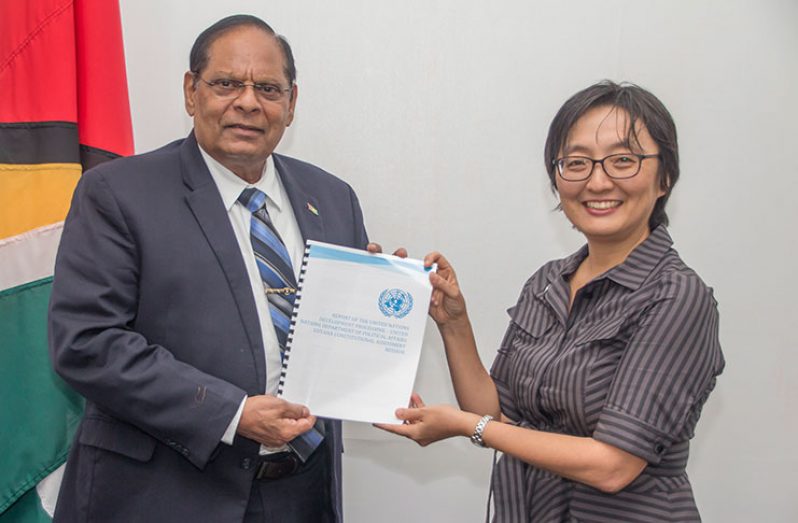-stresses meaningful dialogue, compromise among parties
A UNITED Nations team that conducted an assessment on constitutional reform here has warned that the process must not be rushed and that meaningful dialogue, negotiation and compromise on the part of government, opposition and citizens must be done.
Some members of civil society have been pushing government to move swiftly in tackling the issue, but the UN team in a report submitted to Prime Minister Moses Nagamootoo, warned against “rushing the process of constitutional reform.” Explaining that the timeframe for constitutional reform varies and would be dependent on variables within different countries, the UN team said Guyana, it was surmised, needed to factor in the size of its territory with regard to accessing pockets of citizens and the difficulties associated with reaching consensus.
Mr Nagamootoo had told this newspaper earlier this year that the administration intends to roll out its constitutional reform programme, with the establishment of a Constitutional Consultative Commission, and then the setting up of a secretariat to drive the process. Nagamootoo, who has oversight for governance, said his office had submitted a $80M budget for the programme.
In its report, the UN team said the process of constitutional reform in Guyana creates an opportunity for social cohesion and nation-building. The report, which is up for consideration, speaks to the risks associated with the process of constitutional reform on the basis that Guyana has a history of racial division and ethnic-political conflict.
In mid-2015, Prime Minister Nagamootoo had initiated talks with the then UN Resident Coordinator Khadija Musa, with the aim of acquiring support from the UN during this process. Talks continued with Musa’s successor, Mikiko Tanaka. Those talks resulted in a Constitutional Assessment Mission being conducted here by a team from the UN in February, 2017, in order to advise the Guyana Government and to provide UN decision-makers with context for its support.
Meaningful dialogue
It is intended that the report will be presented to all stakeholders with whom the mission team engaged. The report recommends that a successful constitutional reform process must emphasise meaningful dialogue, negotiation and compromise on the part of government, opposition and citizens.
Additionally, it states that the Constitutional Reform Commission (CRC) must be independent, representative and inclusive of civil society, noting that the public at large must be provided with opportunities to participate. It said too that major attention must be placed on public education in an effort to facilitate effective participation.
To gather information for the mission’s assessment, the UN Delegation met with a wide range of stakeholders, including the Leader of the Opposition and the People’s Progressive Party, the Speaker of the National Assembly, the National Toshaos Council Chairman, Trade Unions, the Rights Commissions, Private Sector Commission, religious bodies, the Guyana Bar Association, international partners and several other civil society bodies.
The UN mission team comprised constitutional and peacekeeping experts Mr Gerardo Noto, Mr Rohan Edrisinha and Mr Jason Gluck, who were assisted by Ms Tanaka and Deputy Resident Coordinator, Ms Shabnam Mallick, along with Mr Fabio Oliva.
The Terms of Reference (TOR) that guided the mission team provided that they would, among other things, assess the political environment in Guyana and the legal and institutional frameworks governing the constitutional reform process and assess the potential role of UNDP-UNDPA in assisting this process and resources required.
Meanwhile, the draft Bill to establish the Constitutional Reform Consultative Commission is being reviewed by the Office of the Attorney General, and would be circulated to stakeholders as soon as the preliminary revision is completed. Prime Minister Nagamootoo has indicated that the proposed Bill would be sent to the Special Select Committee for further review once it is tabled in the National Assembly.
A Steering Committee on Constitutional Reform had said in its report that the commission should consist of four or five constitutional law experts, two or three judges, foreign constitutional law experts (Commonwealth), experienced lawyers, civil society and academics. Accompanying this proposal was a list of experts, who enjoy the confidence of the committee. These experts include: Sir Fenton Ramsahoye, SC; Miles Fitzpatrick, SC; Rex McKay, SC; Ralph Ramkarran, SC; Douglas Mendez, SC; Stephen Fraser; Dr Lloyd Barnett; Dr Nigel Harris; Sir Shridath Ramphal, and Rashleigh Jackson, among others.
Additionally, the report said a three-tiered system for the Commission should be considered, noting that a set of legal experts (6-11) should prepare a draft-based document, incorporating some of the recommendations of the Committee. That document, according to the SCCR, should then be shared with wider stakeholders, including representatives of political parties and civil society.
The expanded commission, the SCCR said, should include one representative from the A Partnership for National Unity (APNU), Alliance For Change (AFC), the People’s Progressive Party (PPP), the trade unions, a youth representative, the Guyana Bar Association (GBA), the Indian Arrival Committee (IAC), the Indigenous Peoples, the African Cultural and Development Association (ACDA), the Hindu community, the Christian community and the Islamic community.



.jpg)









